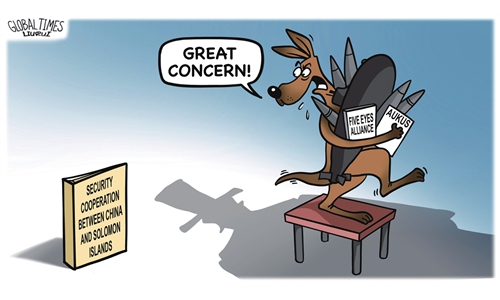US turns Australia into ‘forward base’ against China with B-52 bombers deployment

Illustration: Liu Rui/GT
According to a Monday report from the Australian Broadcasting Corporation (ABC), the US is preparing to deploy up to six nuclear-capable B-52 bombers in northern Australia. An investigation by the Australian media revealed that Washington is planning to expand the Tindal air base, south of Darwin in Australia's Northern Territory. This includes spending $100 million on constructing a parking area that can accommodate the B-52s, which is expected to be completed by the end of 2026.
For more than 60 years, B-52s have been the backbone of Washington's strategic bomber force. As "the most combat-capable bomber in the US inventory," these long-range heavy bombers are able of deploying both nuclear and conventional weapons. In February, the US deployed four B-52 bombers to Guam, so the deployment of the aircraft in Australia proves Washington is aiming to form a pincer offensive against China from two sides.
The US military bases in Australia currently serve as support bases - a relay between forward bases and the rear. By deploying B-52s in Australia, Washington is making Canberra one of its forward military bases, as it already did with Tokyo and Seoul.
Washington's B-52 deployment indeed intends to deter China, particularly over the Taiwan question and the issue of the South China Sea.
But Australia has to understand that China will not make the slightest concession concerning its core interests, especially when the island of Taiwan is involved. If Australia wants to follow the US strategy of playing the Taiwan card to contain China, it is barking up the wrong tree.
Amid growing tensions with China, Australia's Northern Territory has become a critical defense hub for the US, which has committed to spending more than $1 billion to upgrade its military assets throughout the area. Apart from a parking area for B-52s, the US plans a major expansion of the Pine Gap base, a joint US and Australian intelligence base near Alice Springs, to spy on Beijing better. Moreover, Washington wants to establish an Australian division of the US Navy's Submarine Force by selling nuclear-powered submarines to Canberra.
The US only wants to use Australia as a pawn, making the latter its appendage. As a result, Australia will spend vast amounts of money to create more US military bases and help implement the Washington Indo-Pacific Strategy. To put it bluntly, with all that money, what Canberra preserves is Washington's national security, and what it maintains is Washington's regional or even global hegemony. Australia believes that following the US can boost its chance of becoming a great power, but, in fact, doing so will only make such an ambition a fragile dream.
Canberra will bear the risks of undermining its national interests if it continues with its strategy of blindly following the US. On the one hand, Australia is no longer a distant and secluded hideaway from other countries. By serving as a forward US base, Australia will become a battleground once a war occurs between China and the US, as long-range strikes have become common in modern warfare.
On the other hand, Canberra might push China further away as one of its most significant markets and trade partners. Australia needs to realize that developing friendly and cooperative relations with China is more in line with the actual interests of Australia and its people. Australia must have already felt the massive shock from the market deeply. Losing China would put Australia's economic development in an awkward position.
And ironically, while Canberra continues to lose the Chinese market, the US - Australia's ally - is stabbing it in the back by slowly taking up its place in Chinese market. This demonstrates that since the US adopts a basic principle of maximizing its own, there is no such thing as an ally in front of interests.
If Australia goes further and further down the wrong path, it will inevitably end up harming itself for the benefit of the US. Be it the deployment of B-52s or provocation in any other form, Canberra is seeking a temporary solution regardless of the consequences that could mean more disasters and failures.
The author is a Chinese military expert and TV commentator. opinion@globaltimes.com.cn

